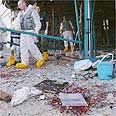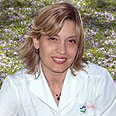

Judy Chayat lives in the town of Gan Neer, which lies on the Gilboa mountain, near the city of Afula close to the Palestinian West Bank city of Jenin.
Chayat, 42, has been working as an emergency room trauma nurse at Haemek Hospital in Afula for 20 years.
Four years ago, prior to the start of the recent conflict between Israel and the Palestinians, Chayat and her husband would visit Jenin every Saturday.
"We ate in restaurants, bought plants and knew a lot of people there. Actually, they became our friends,” she says.
'Angry after each attack'
Afula has experienced a number of Palestinian suicide attacks, as it is in close proximity to Jenin.
Chayat, who has treated casualties from more than 10 terror attacks, says the task was especially difficult during her first year on the job.
"Psychologically, it was very hard to deal with the shocking events," she says. "I saw severe injuries -burns, damaged organs, and sometimes open abdomens."
Chayat says she felt very angry after each attack. She couldn't understand how the lives of civilians who aren't soldiers can be destroyed, and found it difficult to imagine how someone can get onto a bus and blow himself up without thinking of the innocent citizens on their way to work.
In a surprising turn of events, Chayat discovered that one of the patients she treated was a Palestinian involved in a terror attack.
"On the one hand, I was furious at him, but on the other hand, looking at this person made me feel sorry for him," she says. "He looked very young, almost like a boy".
Chayat wondered how such a young person reaches the decision to carry out such a terrible act.
"For sure, something bad happened to him, pushed him to do so,” she says.
'It never ends'
At first, it was easy to feel hatred towards him, but upon looking at his eyes, her feelings changed dramatically. She realized that this "monster," who wanted to explode and kill people, is merely a human being. Now she understands him, in spite of rejecting his way of handling the situation.
The conflict has affected Chayat’s daily life. She and her children were fearful that terrorrists would attack Gan Neer from Jenin. It was a sense of being close to the danger. But their life continued as usual.
"I made an effort to teach my children not to hate Arabs, even though I hear so many people here saying that Arabs and the Palestinians are the enemy,” she says.
The pain she lived with urged her to look for a way to deal with what she saw in the emergency room, so she participated in a number of discussion groups to help her cope with the situation.
Chayat believes if Israelis and Palestinians would simply sit down and talk to each other the conflict would end.
“After we get to know each other, we can develop trust and isolate the extremist groups who reject the peace. The violence leads to more violence. It never ends,” she says.
Article reprinted with permission from 'Bridges,' an Israeli-Palestinian public health magazine sponsored by World Health Organization. Bridges is written, edited and produced by Palestinian and Israeli academics and health professionals. Contact 'Bridges' at bridges@who-health.org















